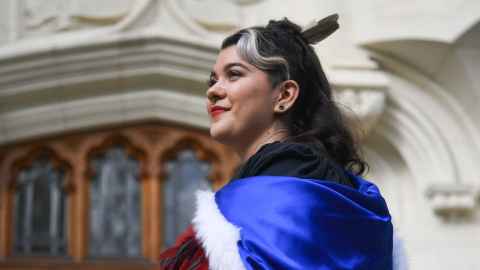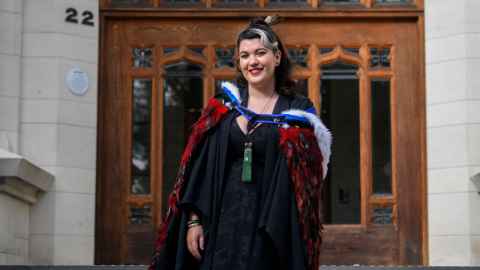Whakapapa at the heart of academic excellence
27 May 2025
Psychology graduate Danya Pavlović shares how waiata, te reo Māori, and a journey of reconnection led to first-class honours – and now a PhD.

Waiata, or song, speaks straight to the heart. In te ao Māori, it’s a way to reconnect with each other, with our stories, and with our whakapapa. Whether at tangihanga or in kapa haka, waiata brings us home.
For Danya Pavlović (Ngāpuhi, Ngāti Hine, Croatian), who graduated with first-class honours in Psychology on 24 May, it was at the heart of her research – exploring the power of waiata and te reo Māori to connect people with their whakapapa and whānau.
Danya’s academic path began with a double major in psychology and Māori Studies. While psychology appealed to her interest in human behaviour, Māori Studies sparked something deeper – an awakening of identity and whakapapa that would shape her personal and scholarly life.
“I’m the first in my whānau to go to university. I didn’t even know who to talk to about degree planning. But I’m so glad I chose a BA – because without it, I don’t think I would’ve reconnected with my whakapapa the way I have.”
She says she originally chose Māori Studies thinking she would just take a few te reo papers and learn about Te Tiriti. “I wasn’t expecting to have my mind opened to so much strength-based history and mātauranga.”
“It hasn’t just shaped my academic path; it’s become woven into my personal journey as a mokopuna reconnecting with whakapapa. It’s meant I can connect more meaningfully with my whānau when I visit our marae.”
During her undergraduate years, Danya became an active member of Ngā Tauira Māori (NTM), the Māori Students’ Association on campus. There she found belonging – and a safe space to unlearn limiting ideas about what it means to be Māori.
“For the first time in my life, I was surrounded by other Māori from all walks of life. Kura kaupapa students helped me with my reo, sitting with me to translate and unpack pūrākau, or stories, relevant to my journey. Others were on the same journey of reconnection, navigating their whakapapa and Māoritanga.
“Through them, I learned there is no single way to be Māori. Having whakapapa Māori is enough.
“Before uni, I thought I needed to be raised in te ao Māori, speak fluent reo, or have a certain 'percentage' of Māori blood or darker skin to claim my identity. Ngā Tauira Māori helped me challenge all of that.”
She also credits the academics and lecturers who guided her learning and modelled excellence.
“I’m so grateful to the Māori academics before me who carved out these spaces – like the NTM hub, Hineahuone.”
“Professor Suzanne Purdy, Dr Patrick Savage, Hineatua Parkinson, Professor Tracey McIntosh, Professor Ngarino Ellis and Dr Tiopira McDowell all had a profound impact on my learning.”

Danya’s whakapapa features Māori and Croatian heritage. She was raised in Tāmaki Makaurau, growing up next door to her Croatian grandparents – her baba and dida – who helped shape her values and sense of whānau.
“Whānau are the most important relationships you can have,” she says. “That relationship has always meant everything.”
Her Māori lineage connects to Ngāpuhi and Ngāti Hine, with ancestral links to Ōtiria and Tau Henare marae. But like many urban Māori, Danya often felt distant from her Māoritanga growing up.
“I mostly saw my whānau when we travelled north for tangi... I didn’t really feel Māori. I used to say, ‘Well, my granddad was Māori, but I’m not’.”
She says that disconnection stemmed from intergenerational displacement. “It was my great grandfather’s generation that was forced out of the valley... I grew up knowing what had happened to our whānau, but always from a distance.”
A turning point came in 2018, when her late grandfather began reclaiming his reo.
“He and my mum were like besties. They started learning te reo Māori together... and I started to feel that wairua awaken in me too.
“During the pandemic, I knew I wanted to study psychology. I picked Māori Studies on a whim – just a few reo papers to connect with my mum and my granddad. And then I ended up doing a whole Māori Studies degree.”
She says her choice was life changing.
“Doing Māori Studies healed that part of my childhood that felt disconnected from whakapapa. I never had the reo, but I’d grown up watching my cousins do kapa haka and sing waiata. Even though I didn’t speak te reo, waiata made me feel like I belonged.”
Now Danya is preparing to do a PhD.
“I’m studying the relationship between waiata and kōrero in te ao Māori – what happens when we sing with strangers, versus when we speak with them. How do these acts build whanaungatanga? What does that mean for our well-being?
“I want to explore whether waiata acts as a cultural mechanism for building relational ties. What happens, wairua-wise, when we sing together?”
Her research draws on mātauranga Māori and psychological theory to understand how creative expression fosters social connection – especially for Māori who feel disconnected from their reo or whakapapa.
“So much of my healing has come from reclaiming voice and space – not through academic English, but through reo and waiata. Singing creates a sense of safety. I want to understand how that translates into building whanaungatanga, even among strangers.”
Part of her thesis will include an autoethnographic account of her honours graduation.
“In the four months leading up to Māori grad, my whānau came to my parents’ house every Monday to learn one of our hapū waiata. I’ve been documenting that emotional journey – mine and theirs – and exploring how singing together at a life event impacts our well-being as Māori.”
She will also be part of an international collaboration completing a quantitative study on the effects of song versus speech in te ao Māori.
“I helped shape the experiment and led the English piloting and now I get to lead the Māori data collection.”
Her third tranch of research is qualitative. “I’d love to use a cultural connectedness scale to identify Māori who feel a bit disconnected from their Māoritanga, invite them in for a day to learn and sing waiata together, and then do focus groups or interviews at the end. I’m inspired by the Hine Rēhia study and hope to explore the well-being impacts of shared waiata experiences.
“When these three strands come together, I hope to present a well-rounded thesis on the well-being impacts of waiata and kōrero in te ao Māori.”
Media contact
Te Rina Ruka-Triponel | Kaitohutohu Pāpāho Māori
E: te.rina.triponel@auckland.ac.nz